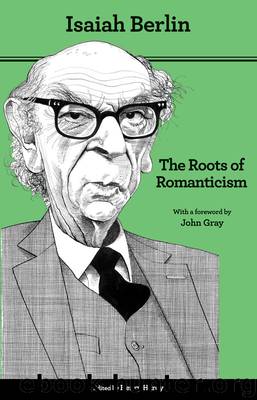The Roots of Romanticism (Second Edition) by Berlin Isaiah Hardy Henry Gray John

Author:Berlin, Isaiah, Hardy, Henry, Gray, John
Language: eng
Format: epub
Publisher: Princeton University Press
Published: 2013-02-12T16:00:00+00:00
1 ‘Fanatical gush’.
1 As to the fallacies of this doctrine, I shall not enter into them here, for it would take me too far afield; but this is the only thin cord by which Kant is still bound to eighteenth-century rationalism.
1 This was rejected by the Scottish writer Ferguson – and perhaps by Burke – but by whom else?
5
Unbridled Romanticism
I NOW COME TO THE FINAL eruption of unbridled Romanticism. According to Friedrich Schlegel, who wrote most authoritatively about this movement, and was indeed a part of it himself, the three factors which most profoundly influenced the entire movement, not only aesthetically but also morally and politically, were, in this order, Fichte’s theory of knowledge, the French Revolution, and Goethe’s famous novel Wilhelm Meister. This is probably a just attribution, and I should like to make it clear why this was so, and in what sense.
In my remarks about Fichte I spoke about his glorification of the active, dynamic and imaginative self. The innovation which Fichte brought into both theoretical philosophy and the theory of art – and to some extent of life – was roughly this. He accepted the view of the empiricists of the eighteenth century that there was some problem about what was meant by speaking about oneself. Hume had said that when he looked within himself as people normally do, when he introspected, he discovered a great many sensations, emotions, fragments of memory, of hope and fear – all kinds of small psychological units – but he failed to perceive any entity which could justly be called a self, and therefore concluded that the self was not a thing, not an object of direct perception, but perhaps simply a name for the concatenation of experiences out of which human personality and human history were formed, simply a kind of string which held together the onions, except that there was no string.
This proposition was accepted by Kant, who then made valiant efforts to recapture some kind of self, but much more passionately by the German Romantics, in particular by Fichte, who laid down the doctrine that it was quite natural that the self should not emerge in cognition. When you are wholly absorbed in an object, whether in looking at a material object in nature, or in listening to sounds – music or something else – or in any other kind of process in which there is an object before you in the contemplation of which you are wholly absorbed, then naturally you are pro tanto not aware of yourself as the absorber. You become aware of the self only when there is some kind of resistance. You become aware of yourself not as an object but as that which is obtruded upon by some kind of recalcitrant reality. When you are looking at something and something intervenes, when you are listening to something and there is some kind of obstacle, it is the impact of the obstacle upon you which makes you aware of your self as
Download
This site does not store any files on its server. We only index and link to content provided by other sites. Please contact the content providers to delete copyright contents if any and email us, we'll remove relevant links or contents immediately.
The Secret History by Donna Tartt(16871)
Red Sparrow by Jason Matthews(4772)
Harry Potter 02 & The Chamber Of Secrets (Illustrated) by J.K. Rowling(3330)
In a Sunburned Country by Bill Bryson(3021)
Figure Drawing for Artists by Steve Huston(2871)
The Daily Stoic by Holiday Ryan & Hanselman Stephen(2775)
Drawing Cutting Edge Anatomy by Christopher Hart(2766)
Japanese Design by Patricia J. Graham(2621)
The Roots of Romanticism (Second Edition) by Berlin Isaiah Hardy Henry Gray John(2613)
Make Comics Like the Pros by Greg Pak(2501)
Harry Potter and the Prisoner of Azkaban (Book 3) by J. K. Rowling(2462)
Stacked Decks by The Rotenberg Collection(2344)
Harry Potter and the Deathly Hallows (7) by J.K. Rowling(2275)
On Photography by Susan Sontag(2197)
Draw-A-Saurus by James Silvani(2155)
Tattoo Art by Doralba Picerno(2134)
Foreign Devils on the Silk Road: The Search for the Lost Treasures of Central Asia by Peter Hopkirk(2117)
The Traveler's Gift by Andy Andrews(2068)
Churchill by Paul Johnson(2066)
